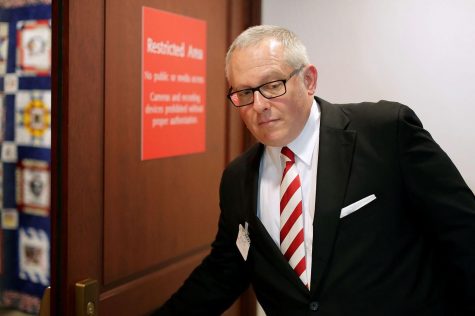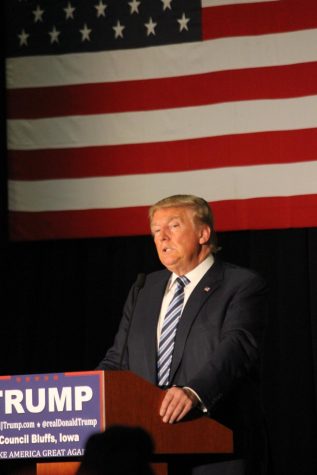Former Democratic Nominees Unite Against President Trump
Former Democratic presidential nominees have come out in support of former Vice President Joe Biden. (Courtesy of Flickr)
September 16, 2020
The 2019-2020 Democratic presidential debates were some of the most entertaining live debates America has seen yet. They presented us with a long list of characters: 29 Democratic candidates. The candidates frequently insulted one another without abandon, playing off the live audiences and getting the most quotable statement. It was no secret that many of the candidates were vying for a claim on the next viral hashtag or video clip to flood Twitter feeds. Once primary voting began, former Vice President Joe Biden quickly secured his nomination and pushed out the other Democratic candidates. Many of the candidates seemed almost eager to drop out and hand the party nomination to Biden, quietly withdrawing from the race and speedily announcing their endorsement of the former vice president.
While there was plenty of bad blood amongst the countless candidates and an endless barrage of hateful words thrown around, they were quick to put this behind them and come together as a party. Never before has America seen a party so united in its efforts to take down a sitting president. Each candidate presented their differing agendas with varying viewpoints and political backgrounds. Nonetheless, they were all quick to support Biden because they all have the same goal: get Donald Trump out of office.
While the debates may seem far behind us, the first one took place on June 26, 2019, a little more than a year ago. At the DNC’s last debate on March 15, 2020, just Biden and Bernie Sanders battled head-to-head. It’s no wonder why the events of this past year feel like such a blur: they were. In the span of a few months, a candidate pool of nearly 30 was boiled down to just one. Biden’s name has occupied many headlines in recent months, prompting the question: Just what are the rest of the ex-candidates up to?
Pete Buttigieg, the friendly, well-mannered mayor of South Bend, Indiana, started off his post-presidential run like almost every other candidate: by swiftly (and publicly) endorsing Joe Biden. Buttigieg made it clear that the Democratic party’s goal was simply to defeat Trump, a goal he even stated as being “much bigger than me becoming president.” At the time of Buttigieg’s endorsement, Sanders was still in the running. However, Sanders, a beloved favorite amongst young, progressive voters, was a bit of an outcast amongst the Democratic party leaders, presenting the party with a newer, more radical platform. The party has earnestly rallied behind Biden, desperate for a win against Trump whilst still rejecting the democratic socialist agenda of Bernie Sanders. In addition to withdrawing from the presidential race, Buttigieg has faced yet another end of an era, finishing his eight-year tenure as mayor and passing along the torch while ringing in the new year. Mayor Pete may be in a small political funk, but don’t be surprised if his name resurfaces if Biden wins the election and starts forming his administration: Buttigieg is likely to be hovering next to his phone like a stood-up date, eagerly awaiting a call from Biden.
Elizabeth Warren, another fan favorite from the ex-nominees, is also outspoken in her support of Biden, even making a speech at the recent Democratic National Convention. Warren focused on the importance of improving child care services in America, boasting of Biden’s plan for the country. However, like many other Democrats, she ended her message by slighting Trump, berating his handling of the COVID-19 pandemic and the economy. “This crisis is on Donald Trump and the Republicans who enabled him,” said Warren. Along with Buttigieg, there has been speculation that Warren is amongst Biden’s top picks for cabinet positions should he secure the presidency.
Bernie Sanders may not have shown the same level of support for Biden as other candidates, but he has certainly been clear in expressing his disapproval of Trump. After Trump’s vague comments on whether or not he would accept the results of the election, Sanders has avidly been preparing the American people for resistance from Trump should he lose the election. Sanders believes it is his duty to “alert the American people about what that nightmarish scenario might look like.” Sanders, as the last Democratic candidate alongside Biden, led the most direct campaign against him — yet once again, his priorities lie most strongly in taking down Trump.
However, the award for “most extreme change in agenda post-debates” has to be presented to none other than Kamala Harris. Though the Democratic candidates frequently insulted Trump while lavishing in the spotlight on the debate stage, one of the most personal attacks came from Harris, who targeted Biden on the issue of race. She brought up her own personal experiences, while criticizing Biden for having made “very hurtful” comments about working with two segregationist senators and supporting school bussing in the ’70s.. The two went back and forth on the issue, with Biden calling her attack on him misleading. Mere months later, Biden proudly announced Harris as his pick for vice president. Ironically enough, the move helped produce a comparatively diverse ticket for the election after Biden and Harris’ issues over race on the debate stage. A racially diverse ticket was important to Biden, who wanted to emulate his own win with Barack Obama in 2008.
Of course, the other candidates have plenty going on in their lives as well. Michael Bloomberg has stuck to his steady tactic of throwing money at issues, donating a whopping $18 million to the DNC, while Andrew Yang is publicly longing for a position in Biden’s theoretical administration.
They might all be going down different paths in terms of their political careers, but one commonality amongst the candidates is their strong aversion to Trump. Although the country may be showing signs of strong division, no one can deny the unifying effects that a common enemy can bring, and the Democratic party has surely found its enemy in Trump.
Taylor Herzlich, FCRH ’23, is a journalism major from Mt Sinai, N.Y.











If you want a picture to show with your comment, go get a gravatar.